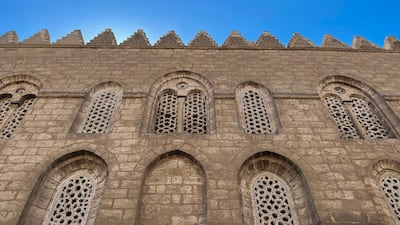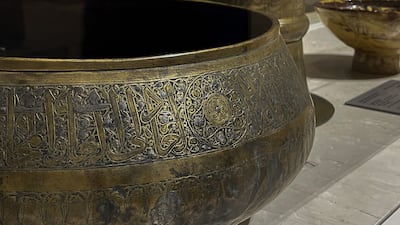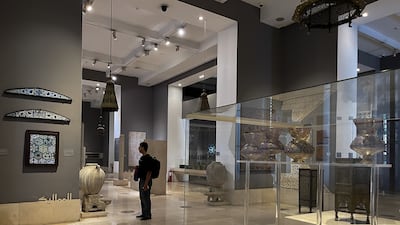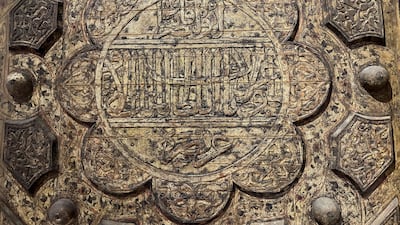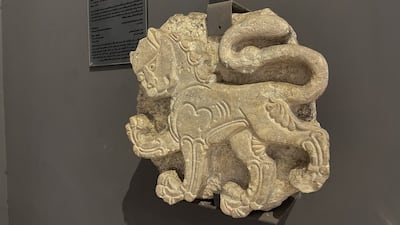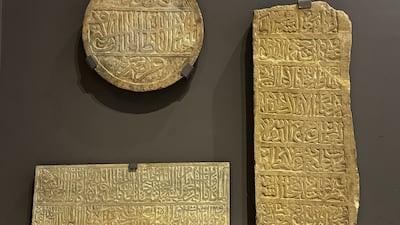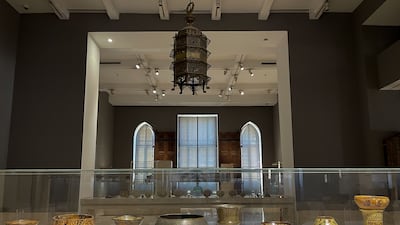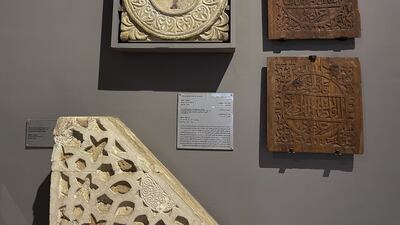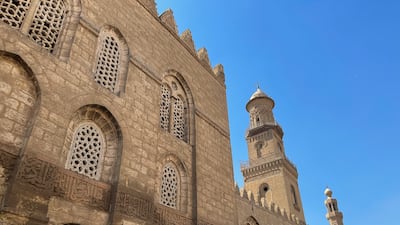Notorious for its brutality and tyranny, the Mamluk age is getting a second look in Egypt these days, with authors, historians and influencers painting a more balanced picture of a unique medieval empire founded and led by slave-soldiers with Cairo as its capital.
Their attempt to revise widely held negative perceptions about the Mamluk era may not be at the heart of the national conversation in Egypt.
However, the intellectual endeavour takes on added significance and relevance because it touches on key identity questions — like who is an Egyptian — in a country where xenophobia is common and many of its 103 million people claim diverse ethnic backgrounds.
“In Egypt, the trend of revising history is chiefly rooted in the fact that we have been fed false narratives for too long. There’s a realisation now by many that alternative narratives do exist,” said Amina El Bendary, associate professor of Arabic and Islamic Studies at the American University in Cairo.
“People have since the 2011 revolution [in Egypt] become more historically conscious. There’s demand, even thirst, for narratives other than those we were taught at school."
In a matter of only a few recent years, a flurry of books on the Mamluks has appeared on bookshop shelves in Egypt. They deal with anything from their governance and relations with the populace and senior Muslim clergy to architecture and military tactics.
Amateur historians have also fuelled the fascination with the Mamluks, creating Facebook pages that explain their history and videos that familiarise viewers with their many surviving monuments.
Such is the scholarly obsession with Mamluk history at present that an Arabic book published in Cairo in 2020 is devoted entirely to chronicling in gruesome detail the era's notoriously high number of assassinations.
In many ways, it can only be befitting that the Mamluk age is receiving this much attention given its uniqueness, the wealth of relevant material available in the works of famed historians such as Ibn Iyas and Al Maqrizi, as well as the majestic mosques, madrasas and palaces they built and still stand in Cairo today.
The revisionist trend appears to be part of a drive among scholars the world over to reread and write history away from the influence of politics, religious beliefs and propaganda.
Strategically located at the crossroads of Europe, Asia and Africa, Egypt has since the dawn of history been conquered, ruled and settled by a long line of outsiders, from the Hyksos, Persians, Greeks and Romans to the Arabs, Ottomans, French and finally the British in the late 19th century.
In contrast, the Mamluks — the word means slaves — did not conquer Egypt, but ruled it for three centuries starting in 1250 and ran its day-to-day affairs for three more centuries on behalf of the Ottomans, who captured the country in 1517.
Who were the Mamluks?
With a few exceptions, Mamluk sultans were members of a military class of foreign-born, slave-soldiers captured when children from places like Asia Minor, Greece, the Balkans and the steppes of Russia.
Sold in Egypt, they were raised by their masters as loyal warriors who successfully defended Egypt against the Crusaders and the hordes of Mongols, before they went on to build an empire that stretched from Egypt to Syria, Hijaz, Yemen and North Africa.
During their reign, Cairo became a key trading centre and a main transit point between Europe and Asia. The imposing Mamluk-era monuments stand majestically to this day in Cairo’s Islamic district, speaking to an era that is second only to the time of the pharaohs when it comes to building.
Ms El Bendary, however, says the Mamluk age was not "one unified and coherent” period and warns against romanticising their era as one of uninterrupted prosperity, cultural revival and building.
There were, for example, frequent bouts of severe oppression, excessive taxation, looting by soldiers, epidemics, famine and harsh discrimination against the large Christian community.
The Mamluks also had the deadly habit of always settling their differences by the sword, plunging the country into horrific bouts of bloodletting that left ordinary Egyptians no choice but to wait them out from the relative safety of their homes.
On closer scrutiny of their track record, according to prominent social historian and author Ammar Hassan, the Mamluks were not as or more brutal than others who took the reins of power in Egypt.
They, however, deserve a better and special place in history.
“You cannot put them in the same basket as the Greeks, the Romans or the French and British. They are foreigners who came to Egypt as slaves but, from that point on, knew no home except Egypt in which they lived and which they defended.”
Unfairly maligned
Mr Hassan’s take on the Mamluks contrasts sharply with the narrative on the Mamluks and Ottomans after them that was spread by the state’s propaganda machine after the overthrow of the monarchy by army officers who seized power in a 1952 coup.
That power grab, according to the official narrative at the time, gave the country its first Egyptian ruler since Pharaonic times in Gen Mohammed Naguib, who ruled briefly before he was removed by Gamal Abdel Nasser, a nationalist army officer whose authoritarian rule lasted nearly 20 years.
For decades after, the Mamluks along with the monarchy established by Ottoman Gen Mehmet Ali in the 1800s were relentlessly demonised and vilified as foreign, corrupt and tyrannical.
Mehmet Ali is widely recognised as the founder of modern Egypt.
In numerous movies, television series and political caricatures, members of Egypt’s ruling, Turkish-speaking elite were depicted as stupid, cruel, morally corrupt and speaking Arabic with a comical accent.
By the same token, much of the “revolutionary” narrative on the Mamluks focused on their “foreignness,” that many of them did not speak Arabic well, were new to Islam or they oppressed Egyptians.
Popular culture
The Mamluks were also stereotyped in Egyptian movies as heartless and obsessed with food and sex. For example, the opening scene of the 1965 film Al Mamaleek depicts a Mamluk sultan who suffers from depression and loss of appetite.
He wanted his court jester to cheer him up. When he failed, he ordered his beheading.
“The Mamluks are wrongly associated in our minds with the sight of a soldier on horseback lashing Egyptians with his whip or collecting excessive taxes,” said Youssef Osama, one of several amateur historians who use YouTube channel to familiarise viewers with Mamluk history and monuments.
“In fact, you cannot really talk about the history of the Arab region without mentioning the Mamluks,” said Mr Osama, whose video posts from historical Mamluk sites in Cairo garner tens of thousands of views.
But perhaps the first attempt at rereading the Mamluks’ heavily chronicled history came much earlier than Mr Osama’s posts or the novels of bestselling and prize-winning author Reem Bassiouney, whose books not only changed stereotypes about the Mamluks, but also endeared them to readers as chivalrous, romantic and devout Muslims who zealously guarded their faith.
In his 1961 novel turned blockbuster movie directed by the late Hungarian-born American Andrew Marton, author Ali Bakatheer explored the often-romanticised beginnings of the Mamluk age in Egypt.
He did that through recounting the dramatic rise to power of a fictional slave-soldier who successfully rallied other Mamluks and Egyptians behind him to defend Egypt against an imminent invasion by the Mongols.
Bakatheer’s portrayal of the background of Mamluks in his novel Oh, Islam! is not much different from his own. Also a poet and playwright, the late Bakatheer was born in Indonesia to a family hailing from Yemen’s southern Hadramout region; but lived most of his life in Egypt.
Bassiouney, the novelist and linguistics professor at the American University in Cairo, has been at the forefront of efforts to revise the history of the Mamluks, passionately appealing through her written work and frequent public talks for a more balanced view of their era.
“I am definitely trying to shatter stereotypes. For example, who is a real Egyptian? To me, it’s someone who cares about Egypt and wants to live and die in Egypt. Ethnicity is not easy to measure in Egypt,” said Bassiouney, whose historical 2018 novel Awlad El Nas portrayed the golden years of the early Mamluk era through the lives of a chivalrous warrior prince, his Egyptian wife and their children.
“The Mamluks are real Egyptians because they cared very much about Egypt and the life of Egyptians. Not all of them, obviously, but it is unfair to portray them simply as bloodthirsty warriors,’ she said.
“They have achieved a great deal in less than 300 years. Some of them were poets, Sufis and sheikhs. Their state represented the last era of Islamic glory, actually.”
Shady Lewis Botros, a London-based novelist and political commentator, shares her view that the Mamluks may have been victimised to satisfy the goals or realise the ambitions of others.
“Ottoman propaganda was built on the demonisation of the Mamluks as not being Muslim enough. The real battle for Napoleon Bonaparte in Egypt was against the Mamluks. His propaganda and that of Mehmet Ali later was based on ending the evil of the Mamluks,” he said.
“What is going on now is a genuine historical revision to set the record straight.”
Tips to stay safe during hot weather
- Stay hydrated: Drink plenty of fluids, especially water. Avoid alcohol and caffeine, which can increase dehydration.
- Seek cool environments: Use air conditioning, fans, or visit community spaces with climate control.
- Limit outdoor activities: Avoid strenuous activity during peak heat. If outside, seek shade and wear a wide-brimmed hat.
- Dress appropriately: Wear lightweight, loose and light-coloured clothing to facilitate heat loss.
- Check on vulnerable people: Regularly check in on elderly neighbours, young children and those with health conditions.
- Home adaptations: Use blinds or curtains to block sunlight, avoid using ovens or stoves, and ventilate living spaces during cooler hours.
- Recognise heat illness: Learn the signs of heat exhaustion and heat stroke (dizziness, confusion, rapid pulse, nausea), and seek medical attention if symptoms occur.
THE APPRENTICE
Director: Ali Abbasi
Starring: Sebastian Stan, Maria Bakalova, Jeremy Strong
Rating: 3/5
Living in...
This article is part of a guide on where to live in the UAE. Our reporters will profile some of the country’s most desirable districts, provide an estimate of rental prices and introduce you to some of the residents who call each area home.
The Pope's itinerary
Sunday, February 3, 2019 - Rome to Abu Dhabi
1pm: departure by plane from Rome / Fiumicino to Abu Dhabi
10pm: arrival at Abu Dhabi Presidential Airport
Monday, February 4
12pm: welcome ceremony at the main entrance of the Presidential Palace
12.20pm: visit Abu Dhabi Crown Prince at Presidential Palace
5pm: private meeting with Muslim Council of Elders at Sheikh Zayed Grand Mosque
6.10pm: Inter-religious in the Founder's Memorial
Tuesday, February 5 - Abu Dhabi to Rome
9.15am: private visit to undisclosed cathedral
10.30am: public mass at Zayed Sports City – with a homily by Pope Francis
12.40pm: farewell at Abu Dhabi Presidential Airport
1pm: departure by plane to Rome
5pm: arrival at the Rome / Ciampino International Airport
Specs
Engine: Electric motor generating 54.2kWh (Cooper SE and Aceman SE), 64.6kW (Countryman All4 SE)
Power: 218hp (Cooper and Aceman), 313hp (Countryman)
Torque: 330Nm (Cooper and Aceman), 494Nm (Countryman)
On sale: Now
Price: From Dh158,000 (Cooper), Dh168,000 (Aceman), Dh190,000 (Countryman)
SPECS
%3Cp%3E%3Cstrong%3EEngine%3A%20%3C%2Fstrong%3E4-litre%20flat-six%0D%3Cbr%3E%3Cstrong%3EPower%3A%20%3C%2Fstrong%3E525hp%20(GT3)%2C%20500hp%20(GT4)%0D%3Cbr%3E%3Cstrong%3ETorque%3A%20%3C%2Fstrong%3E465Nm%20(GT3)%2C%20450Nm%20(GT4)%0D%3Cbr%3E%3Cstrong%3ETransmission%3A%20%3C%2Fstrong%3ESeven-speed%20automatic%0D%3Cbr%3E%3Cstrong%3EPrice%3A%20%3C%2Fstrong%3EFrom%20Dh944%2C000%20(GT3)%2C%20Dh581%2C700%20(GT4)%0D%3Cbr%3E%3Cstrong%3EOn%20sale%3A%20%3C%2Fstrong%3ENow%0D%3Cbr%3E%3C%2Fp%3E%0A
More from Neighbourhood Watch:
The specs
Engine: 4.0-litre V8 twin-turbocharged and three electric motors
Power: Combined output 920hp
Torque: 730Nm at 4,000-7,000rpm
Transmission: 8-speed dual-clutch automatic
Fuel consumption: 11.2L/100km
On sale: Now, deliveries expected later in 2025
Price: expected to start at Dh1,432,000
Specs
Engine: Dual-motor all-wheel-drive electric
Range: Up to 610km
Power: 905hp
Torque: 985Nm
Price: From Dh439,000
Available: Now
The specs
Engine: 4.0-litre flat-six
Torque: 450Nm at 6,100rpm
Transmission: 7-speed PDK auto or 6-speed manual
Fuel economy, combined: 13.8L/100km
On sale: Available to order now
The biog
Born: Kuwait in 1986
Family: She is the youngest of seven siblings
Time in the UAE: 10 years
Hobbies: audiobooks and fitness: she works out every day, enjoying kickboxing and basketball
Benefits of first-time home buyers' scheme
- Priority access to new homes from participating developers
- Discounts on sales price of off-plan units
- Flexible payment plans from developers
- Mortgages with better interest rates, faster approval times and reduced fees
- DLD registration fee can be paid through banks or credit cards at zero interest rates
ACC 2019: The winners in full
Best Actress Maha Alemi, Sofia
Best Actor Mohamed Dhrif, Weldi
Best Screenplay Meryem Benm’Barek, Sofia
Best Documentary Of Fathers and Sons by Talal Derki
Best Film Yomeddine by Abu Bakr Shawky
Best Director Nadine Labaki, Capernaum
JOKE'S%20ON%20YOU
%3Cp%3EGoogle%20wasn't%20new%20to%20busting%20out%20April%20Fool's%20jokes%3A%20before%20the%20Gmail%20%22prank%22%2C%20it%20tricked%20users%20with%20%3Ca%20href%3D%22https%3A%2F%2Farchive.google%2Fmentalplex%2F%22%20target%3D%22_blank%22%3Emind-reading%20MentalPlex%20responses%3C%2Fa%3E%20and%20said%3Ca%20href%3D%22https%3A%2F%2Farchive.google%2Fpigeonrank%2F%22%20target%3D%22_blank%22%3E%20well-fed%20pigeons%20were%20running%20its%20search%20engine%20operations%3C%2Fa%3E%20.%3C%2Fp%3E%0A%3Cp%3EIn%20subsequent%20years%2C%20they%20announced%20home%20internet%20services%20through%20your%20toilet%20with%20its%20%22%3Ca%20href%3D%22https%3A%2F%2Farchive.google%2Ftisp%2Finstall.html%22%20target%3D%22_blank%22%3Epatented%20GFlush%20system%3C%2Fa%3E%22%2C%20made%20us%20believe%20the%20Moon's%20surface%20was%20made%20of%20cheese%20and%20unveiled%20a%20dating%20service%20in%20which%20they%20called%20founders%20Sergey%20Brin%20and%20Larry%20Page%20%22%3Ca%20href%3D%22https%3A%2F%2Farchive.google%2Fromance%2Fpress.html%22%20target%3D%22_blank%22%3EStanford%20PhD%20wannabes%3C%2Fa%3E%20%22.%3C%2Fp%3E%0A%3Cp%3EBut%20Gmail%20was%20all%20too%20real%2C%20purportedly%20inspired%20by%20one%20%E2%80%93%20a%20single%20%E2%80%93%20Google%20user%20complaining%20about%20the%20%22poor%20quality%20of%20existing%20email%20services%22%20and%20born%20%22%3Ca%20href%3D%22https%3A%2F%2Fgooglepress.blogspot.com%2F2004%2F04%2Fgoogle-gets-message-launches-gmail.html%22%20target%3D%22_blank%22%3Emillions%20of%20M%26amp%3BMs%20later%3C%2Fa%3E%22.%3C%2Fp%3E%0A
The%20specs%3A%202024%20Mercedes%20E200
%3Cp%3E%3Cstrong%3EEngine%3A%20%3C%2Fstrong%3E2.0-litre%20four-cyl%20turbo%20%2B%20mild%20hybrid%0D%3Cbr%3E%3Cstrong%3EPower%3A%20%3C%2Fstrong%3E204hp%20at%205%2C800rpm%20%2B23hp%20hybrid%20boost%0D%3Cbr%3E%3Cstrong%3ETorque%3A%20%3C%2Fstrong%3E320Nm%20at%201%2C800rpm%20%2B205Nm%20hybrid%20boost%0D%3Cbr%3E%3Cstrong%3ETransmission%3A%20%3C%2Fstrong%3E9-speed%20auto%0D%3Cbr%3E%3Cstrong%3EFuel%20consumption%3A%20%3C%2Fstrong%3E7.3L%2F100km%0D%3Cbr%3E%3Cstrong%3EOn%20sale%3A%20%3C%2Fstrong%3ENovember%2FDecember%0D%3Cbr%3E%3Cstrong%3EPrice%3A%20%3C%2Fstrong%3EFrom%20Dh205%2C000%20(estimate)%3C%2Fp%3E%0A
LA LIGA FIXTURES
Friday Celta Vigo v Villarreal (midnight kick-off UAE)
Saturday Sevilla v Real Sociedad (4pm), Atletico Madrid v Athletic Bilbao (7.15pm), Granada v Barcelona (9.30pm), Osasuna v Real Madrid (midnight)
Sunday Levante v Eibar (4pm), Cadiz v Alaves (7.15pm), Elche v Getafe (9.30pm), Real Valladolid v Valencia (midnight)
Monday Huesca v Real Betis (midnight)
GAC GS8 Specs
Engine: 2.0-litre 4cyl turbo
Power: 248hp at 5,200rpm
Torque: 400Nm at 1,750-4,000rpm
Transmission: 8-speed auto
Fuel consumption: 9.1L/100km
On sale: Now
Price: From Dh149,900
EPL's youngest
- Ethan Nwaneri (Arsenal)
15 years, 181 days old
- Max Dowman (Arsenal)
15 years, 235 days old
- Jeremy Monga (Leicester)
15 years, 271 days old
- Harvey Elliott (Fulham)
16 years, 30 days old
- Matthew Briggs (Fulham)
16 years, 68 days old
The%20specs
%3Cp%3E%3Cstrong%3EEngine%3A%3C%2Fstrong%3E%20Dual%20synchronous%20electric%20motors%0D%3Cbr%3E%3Cstrong%3EPower%3A%20%3C%2Fstrong%3E660hp%0D%3Cbr%3E%3Cstrong%3ETorque%3A%20%3C%2Fstrong%3E1%2C100Nm%0D%3Cbr%3E%3Cstrong%3ETransmission%3A%20%3C%2Fstrong%3ESingle-speed%20automatic%0D%3Cbr%3E%3Cstrong%3ETouring%20range%3A%20%3C%2Fstrong%3E488km-560km%0D%3Cbr%3E%3Cstrong%3EPrice%3A%20%3C%2Fstrong%3EFrom%20Dh850%2C000%20(estimate)%0D%3Cbr%3E%3Cstrong%3EOn%20sale%3A%20%3C%2Fstrong%3EOctober%3C%2Fp%3E%0A
Results
Stage three:
1. Stefan Bissegger (SUI) EF Education-EasyPost, in 9-43
2. Filippo Ganna (ITA) Ineos Grenadiers, at 7s
3. Tom Dumoulin (NED) Jumbo-Visma, at 14s
4. Tadej Pogacar (SLO) UAE-Team Emirates, at 18s
5. Joao Almeida (POR) UAE-Team Emirates, at 22s
6. Mikkel Bjerg (DEN) UAE-Team Emirates, at 24s
General Classification:
1. Stefan Bissegger (SUI) EF Education-EasyPost, in 9-13-02
2. Filippo Ganna (ITA) Ineos Grenadiers, at 7s
3. Jasper Philipsen (BEL) Alpecin Fenix, at 12s
4. Tom Dumoulin (NED) Jumbo-Visma, at 14s
5. Tadej Pogacar (SLO) UAE-Team Emirates, at 18s
6. Joao Almeida (POR) UAE-Team Emirates, at 22s
Conflict, drought, famine
Estimates of the number of deaths caused by the famine range from 400,000 to 1 million, according to a document prepared for the UK House of Lords in 2024.
It has been claimed that the policies of the Ethiopian government, which took control after deposing Emperor Haile Selassie in a military-led revolution in 1974, contributed to the scale of the famine.
Dr Miriam Bradley, senior lecturer in humanitarian studies at the University of Manchester, has argued that, by the early 1980s, “several government policies combined to cause, rather than prevent, a famine which lasted from 1983 to 1985. Mengistu’s government imposed Stalinist-model agricultural policies involving forced collectivisation and villagisation [relocation of communities into planned villages].
The West became aware of the catastrophe through a series of BBC News reports by journalist Michael Buerk in October 1984 describing a “biblical famine” and containing graphic images of thousands of people, including children, facing starvation.
Band Aid
Bob Geldof, singer with the Irish rock group The Boomtown Rats, formed Band Aid in response to the horrific images shown in the news broadcasts.
With Midge Ure of the band Ultravox, he wrote the hit charity single Do They Know it’s Christmas in December 1984, featuring a string of high-profile musicians.
Following the single’s success, the idea to stage a rock concert evolved.
Live Aid was a series of simultaneous concerts that took place at Wembley Stadium in London, John F Kennedy Stadium in Philadelphia, the US, and at various other venues across the world.
The combined event was broadcast to an estimated worldwide audience of 1.5 billion.
Specs
Engine: Duel electric motors
Power: 659hp
Torque: 1075Nm
On sale: Available for pre-order now
Price: On request
The specs: 2018 Ducati SuperSport S
Price, base / as tested: Dh74,900 / Dh85,900
Engine: 937cc
Transmission: Six-speed gearbox
Power: 110hp @ 9,000rpm
Torque: 93Nm @ 6,500rpm
Fuel economy, combined: 5.9L / 100km
The specs
Engine: 1.5-litre turbo
Power: 181hp
Torque: 230Nm
Transmission: 6-speed automatic
Starting price: Dh79,000
On sale: Now
The specs
Engine: 2.0-litre 4-cyl turbo
Power: 247hp at 6,500rpm
Torque: 370Nm from 1,500-3,500rpm
Transmission: 10-speed auto
Fuel consumption: 7.8L/100km
Price: from Dh94,900
On sale: now
The National's picks
4.35pm: Tilal Al Khalediah
5.10pm: Continous
5.45pm: Raging Torrent
6.20pm: West Acre
7pm: Flood Zone
7.40pm: Straight No Chaser
8.15pm: Romantic Warrior
8.50pm: Calandogan
9.30pm: Forever Young
Company%20profile%20
%3Cp%3E%3Cstrong%3EName%3A%20%3C%2Fstrong%3EYodawy%3Cbr%3E%3Cstrong%3EBased%3A%3C%2Fstrong%3E%20Egypt%3Cbr%3E%3Cstrong%3EFounders%3A%20%3C%2Fstrong%3EKarim%20Khashaba%2C%20Sherief%20El-Feky%20and%20Yasser%20AbdelGawad%3Cstrong%3E%3Cbr%3ESector%3A%20%3C%2Fstrong%3EHealthTech%3Cbr%3E%3Cstrong%3ETotal%20funding%3A%20%3C%2Fstrong%3E%2424.5%20million%3Cbr%3E%3Cstrong%3EInvestors%3A%20%3C%2Fstrong%3EAlgebra%20Ventures%2C%20Global%20Ventures%2C%20MEVP%20and%20Delivery%20Hero%20Ventures%2C%20among%20others%3Cstrong%3E%3Cbr%3ENumber%20of%20employees%3A%3C%2Fstrong%3E%20500%3Cbr%3E%3C%2Fp%3E%0A
The National Archives, Abu Dhabi
Founded over 50 years ago, the National Archives collects valuable historical material relating to the UAE, and is the oldest and richest archive relating to the Arabian Gulf.
Much of the material can be viewed on line at the Arabian Gulf Digital Archive - https://www.agda.ae/en
THE BIO: Martin Van Almsick
Hometown: Cologne, Germany
Family: Wife Hanan Ahmed and their three children, Marrah (23), Tibijan (19), Amon (13)
Favourite dessert: Umm Ali with dark camel milk chocolate flakes
Favourite hobby: Football
Breakfast routine: a tall glass of camel milk
Palestine and Israel - live updates
Ferrari 12Cilindri specs
Engine: naturally aspirated 6.5-liter V12
Power: 819hp
Torque: 678Nm at 7,250rpm
Price: From Dh1,700,000
Available: Now
Moon Music
Artist: Coldplay
Label: Parlophone/Atlantic
Number of tracks: 10
Rating: 3/5
Killing of Qassem Suleimani
How to join and use Abu Dhabi’s public libraries
• There are six libraries in Abu Dhabi emirate run by the Department of Culture and Tourism, including one in Al Ain and Al Dhafra.
• Libraries are free to visit and visitors can consult books, use online resources and study there. Most are open from 8am to 8pm on weekdays, closed on Fridays and have variable hours on Saturdays, except for Qasr Al Watan which is open from 10am to 8pm every day.
• In order to borrow books, visitors must join the service by providing a passport photograph, Emirates ID and a refundable deposit of Dh400. Members can borrow five books for three weeks, all of which are renewable up to two times online.
• If users do not wish to pay the fee, they can still use the library’s electronic resources for free by simply registering on the website. Once registered, a username and password is provided, allowing remote access.
• For more information visit the library network's website.
First Person
Richard Flanagan
Chatto & Windus
What are the main cyber security threats?
Cyber crime - This includes fraud, impersonation, scams and deepfake technology, tactics that are increasingly targeting infrastructure and exploiting human vulnerabilities.
Cyber terrorism - Social media platforms are used to spread radical ideologies, misinformation and disinformation, often with the aim of disrupting critical infrastructure such as power grids.
Cyber warfare - Shaped by geopolitical tension, hostile actors seek to infiltrate and compromise national infrastructure, using one country’s systems as a springboard to launch attacks on others.
WOMAN AND CHILD
Director: Saeed Roustaee
Starring: Parinaz Izadyar, Payman Maadi
Rating: 4/5
The specs
AT4 Ultimate, as tested
Engine: 6.2-litre V8
Power: 420hp
Torque: 623Nm
Transmission: 10-speed automatic
Price: From Dh330,800 (Elevation: Dh236,400; AT4: Dh286,800; Denali: Dh345,800)
On sale: Now
Racecard
%3Cp%3E6pm%3A%20The%20Madjani%20Stakes%20%E2%80%93%20Group%202%20(PA)%20Dh97%2C500%20(Dirt)%201%2C900m%3Cbr%3E6.35pm%3A%20Graduate%20Stakes%20%E2%80%93%20Conditions%20(TB)%20Dh100%2C000%20(D)%201%2C400m%3Cbr%3E7.10pm%3A%20Longines%20Dolcevita%20Collection%20%E2%80%93%20Maiden%20(TB)%20Dh82%2C500%20(D)%201%2C400m%3Cbr%3E7.45pm%3A%20Longines%20Legend%20Driver%20Collection%20%E2%80%93%20Maiden%20(TB)%20Dh82%2C500%20(D)%201%2C600m%3Cbr%3E8.20pm%3A%20Longines%20Master%20Collection%20%E2%80%93%20Handicap%20(TB)%20Dh105%2C000%20(D)%201%2C200m%3Cbr%3E8.55pm%3A%20Longines%20Record%20Collection%20%E2%80%93%20Handicap%20(TB)%20Dh87%2C500%20(D)%202%2C200m%3Cbr%3E9.30pm%3A%20Longines%20Spirit%20Collection%20%E2%80%93%20Handicap%20(TB)%20Dh87%2C500%20(D)%201%2C600m%3C%2Fp%3E%0A


